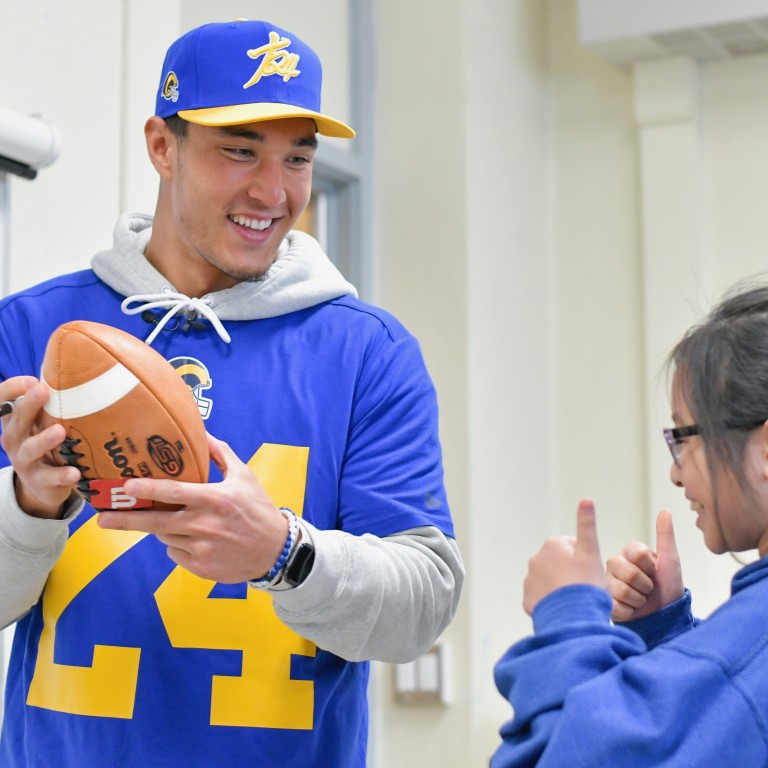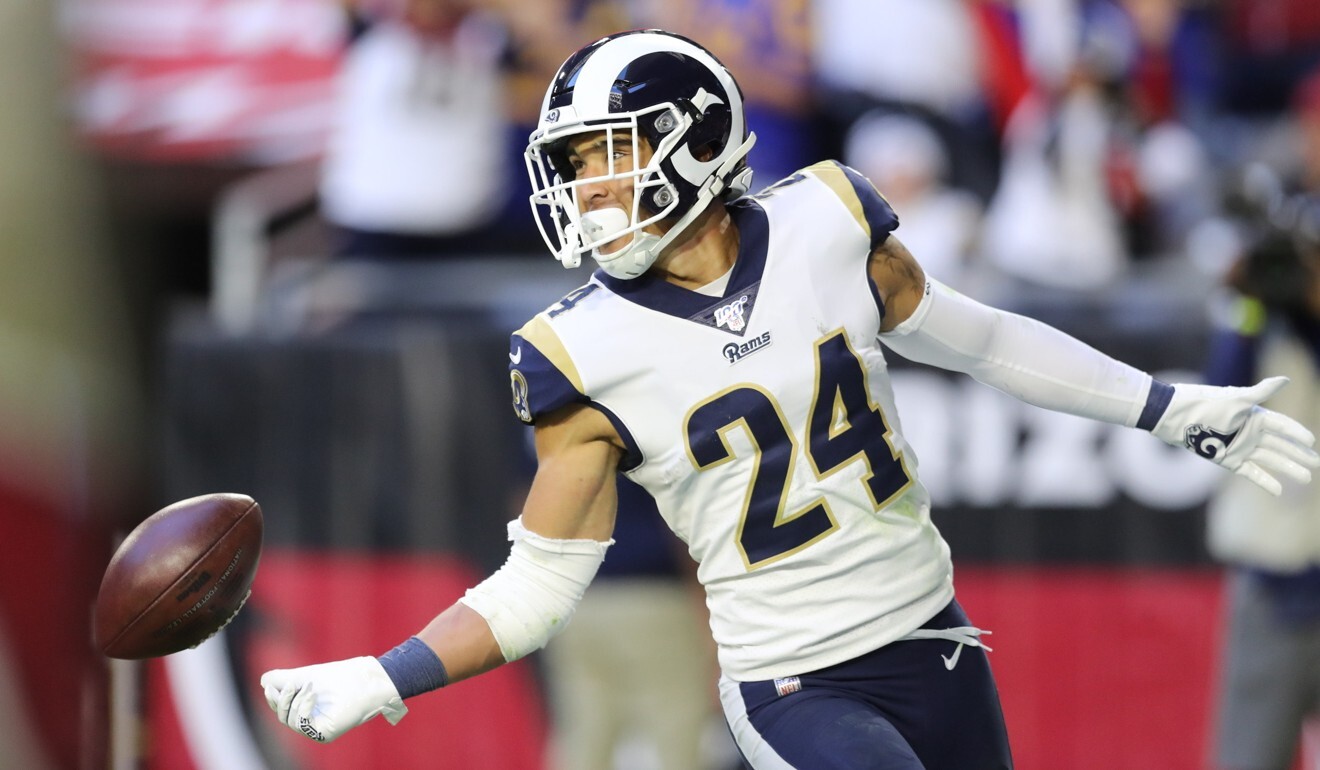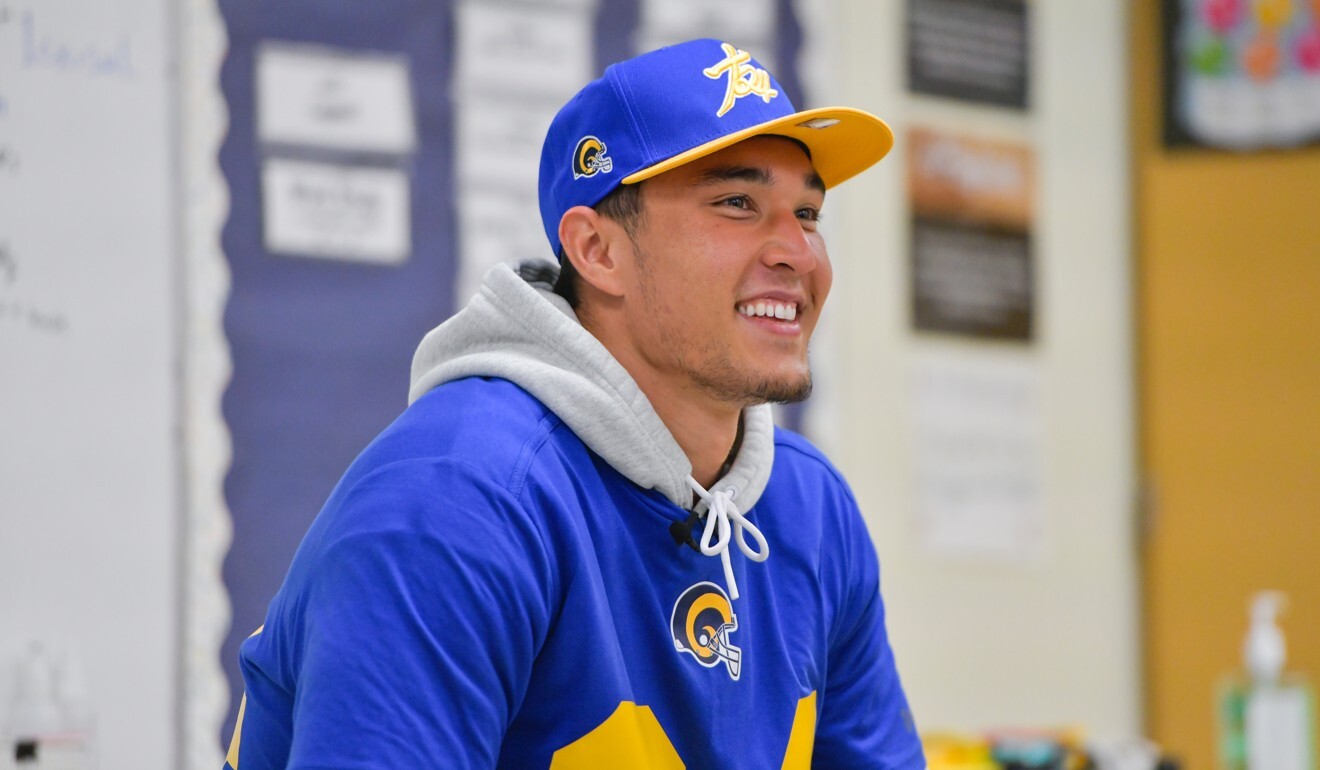
Chinese-American NFL star Taylor Rapp condemns ‘Chinese virus’ rhetoric and racially charged attacks
- The promising LA Rams safety calls increased discrimination and xenophobia towards Asian-Americans ‘nonsense’
- Rapp’s first pro-career trip to China in February cancelled due to Covid-19 outbreak
As Chinese-American NFL star Taylor Rapp undergoes strict self-imposed house quarantine for his beloved Shanghainese grandparents’ sake, he has a bone to pick with those labelling the Covid-19 pandemic the “Chinese virus”.
“It’s getting pretty hectic over here in the US,” Rapp told the Post after finishing another makeshift workout routine at home in Washington. “My family is good and we’re trying to stay safe during these crazy times. I’m only really worried about my grandparents because they’re in their nineties, so I’m trying to stay extra careful around them.”
As of Thursday evening, the WHO and relevant health authorities estimated the US as having a staggering 215,417 confirmed and presumptive cases combined – overtaking the likes of China, Italy and Spain – and 5,116 deaths.
“I’ve talked to both my parents and grandparents and they said they haven’t experienced something of this magnitude throughout the world where we’re literally shutting everything down, all business and life,” said the 22-year-old Rapp, born in Atlanta, Georgia, to a Canadian-American father and Chinese mother.


“I’m sure you’ve seen in the States all these racist attacks and xenophobia – all that nonsense going around just because of seeing the government and elected officials call the virus the ‘Chinese virus’. Obviously, I don’t want to take sides, but I don’t think it’s politically correct – even right – to call the virus the ‘Chinese virus’.
“I don’t think the virus has any nationality or race. It doesn’t discriminate, so I definitely don’t think that’s the right thing to do. By calling it a ‘Chinese virus’, it adds to the fuel for people to be racist towards Asians. It adds to the hatred.
“You see a lot of racism and people being violent to communities because of all this, and that’s only going to make us weaker. The only way we overcome this tragedy is if we come together, instead of dividing each other.”

“It’s definitely impacted me and the people around me, but luckily it’s our off-season in the NFL – I’ve seen sports like basketball and baseball where they halt or stop their seasons. We’re still not doing our [preseason] workouts yet, but it’s hard because you need to get workouts in and figure out how to train by yourself. With all the gyms closed down, you have to find really creative ways to do so. I’m trying to adjust on the fly and adapt to the times,” Rapp said.
“We were supposed to go to Shanghai and Beijing in February, but unfortunately we had to cancel because that was right in the midst of the outbreak throughout China,” Rapp said. “I was going to hold a football camp in each city, visit the Nike headquarters, and do a signing event with my Chinese-based logo New Era hats.
“My mum was born and raised in Shanghai, so those communities are very dear to her heart. We were even going to visit a few elementary schools – the plan was to give as much back as possible,” said Rapp, who last visited the mainland more than 10 years ago.
“I’m aware that my name has been growing out there and there are some fans, so I want to be able to show my thanks face-to-face. The world is more important than me and all this, but definitely we’ll be making a trip out there once it settles down.”
Rapp had intended to launch his meaningful Chinese character-themed hats during the trip East. After all, it was the Chinese side of the family who came up with the calligraphy.
“My grandparents and my mum put together this logo for my branding. It’s the incorporation of the characters from my Chinese name [Chi Youjin] and my number [24]. The character ‘You’ was given by my grandparents because it looked like my English initials, T.R. If you look at it you can see how its incorporated,” said Rapp, whose grandfather – who he calls gong gong – also designs his grandson’s tattoos; be it Confucius’ five virtues on his oblique, the year-of-the-ox zodiac on his deltoid, or the Chinese character for love spread across his pectoral.
In the meantime, the hard-hitting defender has taken to warming hearts around the communities that raised him. Rapp donated about 100,000 meals to struggling kids and families.
“School is closing down and some families won’t be able to provide meals for their kids. I donated 50,000 meals to Food Lifeline in Seattle as I grew up in Washington, and 50,000 to Meals on Wheels in West LA because obviously I play for the LA Rams. Those are two communities dear to my heart and I wanted to contribute during these crazy times,” he said.
In December, Rapp also visited Castelar Elementary School, a school in the heart of Los Angeles’ Chinatown with the highest population of Asian-American students in the city. He taught classes and took selfies before treating the students to a Christmas present shopping spree.
“I just want to inspire kids that may have been in my position growing up,” he said. “There’s not a lot of Asian-Americans to look up to in both college and pro sports. That was difficult for me growing up because every other kid had someone to look up to or relate to. I used that as fuel to the fire and that drove me to try to break barriers and show that it doesn’t matter where you came from, anything is possible if you work hard to make it to the highest level.”

